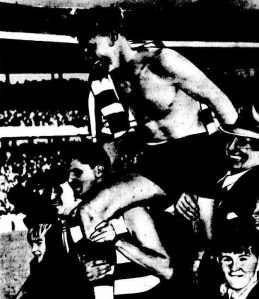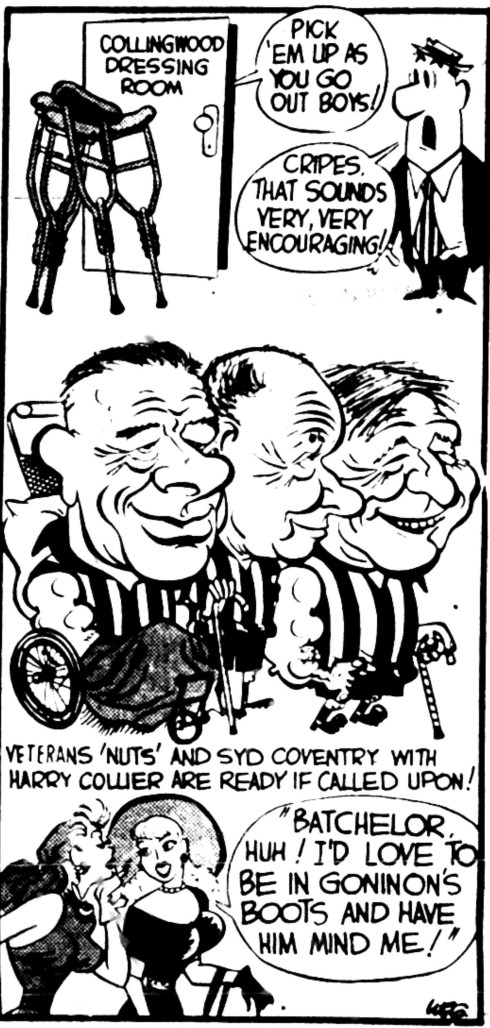Archive for the ‘1952 Grand Final’ Category
Looking back at the 1952 Grand Final & its aftermath
To really grasp the significance of Collingwood’s 1953 season and their historic, drought breaking Grand Final victory of that year, one has to look back twelve months earlier, when Geelong comfortably defeated the Magpies by 46 points in the 1952 Grand Final. The strength and overall dominance of the Cats’ team of the early 1950s cannot be overemphasised. As they entered the 1952 Grand Final Geelong were not just the reigning premier but were also in the middle of what is still the longest unbeaten streak in VFL/AFL history and had easily defeated Collingwood by 54 points in the Second Semi-Final two weeks prior. The Cats were the undeniable favourites.
Most football observers predicted that the Cats would easily defeat the Magpies in the 1952 decider and whilst the final score of the Grand Final seems to indicate this, what it does not show is that Collingwood did not give up the match without a fight. In the end the courage and determination of the Magpies was simply not enough to even get close to the brilliant Geelong juggernaut, although the Cats clearly did not impress everyone. Writing in the Argus Essendon’s legendary coach Dick Reynolds was clearly underwhelmed by the Geelong effort. He thought that the Cats failed to live up to their stellar reputation and that they failed to turn on the fireworks that everyone had been expecting.(1) Reynolds praised the Magpies whose side was seriously depleted by injuries, and thought that if they were at full strength they would probably be more than a match for the mighty Geelong team.(2) Reynolds concluded that their performance in the Grand Final proved that the Geelong team, who were starting to be dubbed the ‘Invincibles’ (3) were far from unbeatable.(4) This would perhaps prove to be prophetic twelve months later.
The Age ‘s Percy Beams said that although “…it was apparent from the start that the Magpies lacked the team balance and skill of their opponents, their sheer determination and concentration worried Geelong into mediocrity…”(5) and that there was a belief among the other sides “…that many Geelong players could be robbed of their confidence to do their best under pressure.”(6) Again these words would prove to be prophetic in 1953 and one wonders whether the Cats’ became too complacent during this time and started to believe that even if they did not play at their best they could still easily beat their nearest opposition.
Collingwood’s biggest problem on the day of the 1952 Grand Final was their inability to kick goals as they were handicapped by what Beams called an inadequate forward division due mainly to the strength of the Cat’s defenders. (7) Collingwood used Harvey Stevens as a makeshift full-forward and whilst he had several opportunities to goal there were many occasions where he dropped marks inside the goal square, with the Argus reckoning he could have kicked six goals if he had been able to hold onto his marks.(8) By the start of the ’53 season Stevens would no longer be a Magpie, having been let go, but he did end up at Footscray and would win their best and fairest award in 1953 and become a member of their only premiership team in 1954.
Collingwood only had two goal scorers for the day in wingman Thorold Merrett and forward pocket Jack Parker, whilst Geelong’s George Goninon kicked five and Neil Trezise kicked four. Things would again be very different in a years time, as prior to the ’53 Grand Final Geelong would drop Goninon for an off-field indiscretion, a move that many Cats’ fans and Goninon believe cost them the 1953 premiership.
Collingwood simply ran out of legs at the end of the match, although Bob Rose always battled tirelessly. (9) Collingwood’s skipper Lou Richards also ended up injured in the trainers hands with an injured head and bleeding arm (10). Geelong were simply the quicker team and player with much greater teamwork than the Magpies (11), although Collingwood’s bustling had the Cats worried on occasions. (12) The Magpies also suffered from great inaccuracy in front of goal kicking seven behinds in the final quarter, showing their generally haphazard approach to goal. (13)
Scores
Team |
1st Quarter |
2nd Quarter |
3rd Quarter |
4th Quarter |
Geelong |
4.2.26 |
5.3.33 |
11.6.72 |
13.8.86 |
Collingwood |
1.1.7 |
3.3.21 |
5.3.33 |
5.10.40 |
Attendance – 82,890
Goalkickers
Geelong – Goninon 6, Trezise 4, Davis 1, Flanagan 1, McMaster 1, Worner 1
Collingwood – Parker 3, Merrett 2
Best
Geelong – Williams, Trezise, Morrison, Goninon, Davis, B. Smith, Flanagan
Collingwood – B. Rose, Merrett, Dunstan, W. Twomey, Parker, M. Twomey, Mann
________________________________________________________________________________________________________________
AFTERMATH
Was the reason Geelong lost the 1953 Grand Final because they became too arrogant? Did they believe that they were so far ahead of their nearest rivals that they could beat anyone even when they were not playing to the best of their considerable ability? There is one story that I think sums up the arrogance of the Geelong team of the early 1950s which I thought was apocryphal when I first heard it but as all the major Melbourne newspapers reported it I guess that it is in fact true. According to the Sun the evening after the ’52 Grand Final the president of Geelong, Cr. J. Jennings, accompanied by players and officials, tried to bury a dead (or as the Age put it, stuffed) magpie, in front of the celebratory crowd at Kardinia Park. (14) The players carried the magpie in a coffin but the ceremony had to be cut short as the crowd surged forward and women and children were in danger of being trampled. (15) Nowadays football teams control to an extent what they say and do off the field in relations to other teams so as not to give the opposition ammunition to use in future matches, but this did not seem to worry the Cats in 1952. I could not imagine what they would have done if they had beaten Richmond or Fitzroy in the Grand Final. Also could it have been this arrogance as well as morality that led them to drop their leading goal kicker twelve months later? Did Geelong really think they could beat Collingwood without one of the best players in the side? I guess that we will never know.
As for Collingwood they put up a gallant effort but just were not good enough on the day. They did have a lot of injuries during the 1952 season and their stocks were depleted going into the 1952 decider, missing Peter Lucas and Pat Twomey, but they battled hard and exposed a few chinks in the Cats’ armour. Nobody expected Collingwood to win going into the big match with even two of the Magpie’s former heroes in Dan Minogue and Harold Rumney tipping against their old club. (16) Rarely do players ever make their AFL/VFL debuts in a Grand Final but 22-year-old Magpie Keith Batchelor did in 1952, named as full-back on Geelong’s champion forward George Goninon. The game looked lost before the teams took the field. Surely things would go better for the Magpies in 1953?
_________________________________________________________________________________________________________
Footnotes
- Reynolds, R & Dunn, J – The Argus newspaper, Monday September 29, 1952, page 9
- Reynolds, R & Dunn, J – The Argus newspaper, Monday September 29, 1952, page 9
- Ryan. P – The Unbeatables – from We Are Geelong, The Story of the Geelong Football Club – John Murray – The Slattery Media Group, page 74
- Reynolds, R & Dunn, J – The Argus newspaper, Monday September 29, 1952, page 9
- Beams, P – The Age – Monday September 29, 1952, page 14
- Beams, P – The Age – Monday September 29, 1952, page 14
- Beams, P – The Age – Monday September 29, 1952, page 14
- Dunn, J & Johnson, I – The Argus – Monday September 29, 1952, page 10
- Brown, A – The Herald – Saturday September 27, 1952, page 19
- Brown, A – The Herald – Saturday September 27, 1952, page 19
- Brown, A – The Herald – Saturday September 27, 1952, page 19
- Brown, A – The Herald – Saturday September 27, 1952, page 19
- Brown, A – The Herald – Saturday September 27, 1952, page 19
- The Sun – Monday September 29, 1952 – page 1
- The Sun – Monday September 29, 1952 – page 1
- The Sun – Saturday September 27, 1952




